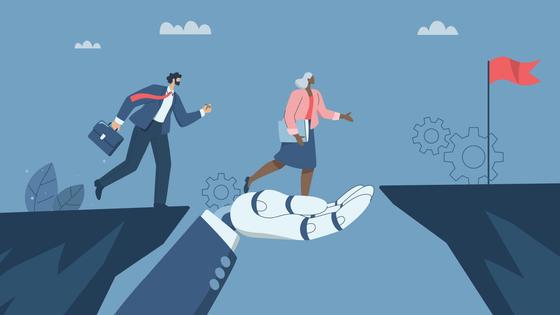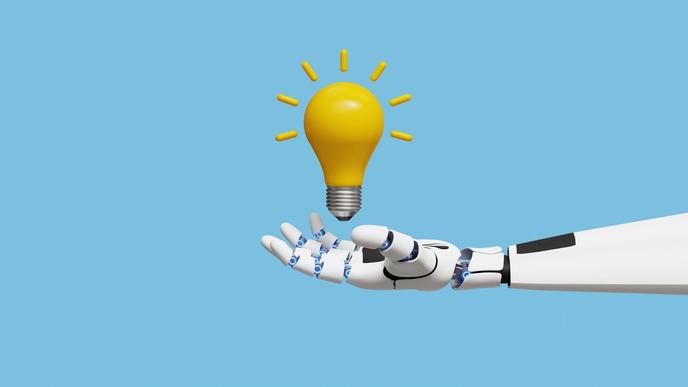AI as a Personal Mentor: How to Upgrade Your Skills Faster
Just a couple of years ago, people were wary of the possibilities of artificial intelligence, but now even the most skeptical users are applying neural networks in one way or another.

The advantages are obvious - automation of routine processes, instant access to information, quick fact-checking, systematization of large datasets, and so on. Those who began to harness AI when it first went mainstream are now impressively effective, but even if you were skeptical at first, there's still time to catch up. One good place to start is by using AI for self-education. In this article, we'll explore how neural networks help you systematically upgrade any skill.
Instant Feedback and Objective Criticism
Imagine you're trying to solve a Python problem. In the past, you would have had to check everything yourself - search through open sources, compare solutions, or send your code to an instructor and wait for feedback to find out whether you made a mistake. Now it happens instantly. Neural networks - from China's DeepSeek to America's ChatGPT - not only detect mistakes and inaccuracies but also explain why you might have made them and how to fix them. Moreover, an AI assistant like GitHub Copilot can immediately suggest a more optimal version of your code.
AI can evaluate not just correctness, but also the quality of your work. You can ask it to assess an essay, writing style, the creativity of a design idea, or the accuracy of a report (but remember confidentiality - don't upload personal data or sensitive information to AI!). The neural network will give you substantive feedback and advice on how to improve your project.
So even if you continue doing routine tasks manually, you can still use AI to check your work. By regularly receiving feedback, objective critique, and improvement suggestions, you'll not only learn to avoid mistakes faster but also become calmer about criticism - an essential part of developing any skill.
100-Level Personalization
It's no secret that most textbooks, manuals, and workbooks are created for the "average" student. They can't take into account individual traits like learning speed or preferred learning style. AI, however, can create a study plan based on your personal goals, preferences, interests, and learning specifics.
To do this, you just need to share your initial inputs with the neural network - what exactly you want to learn or which skill you want to improve. Your goals can vary: preparing for a job interview, gaining a missing skill, retraining for a new field, entering a university, getting a promotion, or brushing up on a foreign language for travel.
The algorithm will analyze your answers, ask follow-up questions, and offer a customized learning plan, additional reading materials, and specific exercises to develop the necessary skill. Then, as you progress, the AI will track your pace, analyze recurring mistakes, and adjust your plan accordingly.
Interactivity

AI-based learning isn't passive - it's active. That means the learner doesn't just receive information but interacts with the neural network, tests different solutions, and gets feedback while solving quests, exercises, tests, and other interactive tasks.
AI can take on different roles - teacher, conversation partner, interviewer, or examiner.
The biggest enemy of self-learning is loss of interest. AI helps prevent that by turning the process into a game and reinforcing your sense of achievement, boosting motivation and engagement.
Integration with Courses and Apps
Learning becomes most effective when AI stops being "just a chatbot" and starts working in combination with other platforms and apps.
For example, intelligent online courses - many educational platforms already use AI to select the next lessons based on your previous performance, create personalized homework, and answer questions about the material in real time. Thanks to AI, the average time required to master a topic is now cut in half.
Among AI-powered apps, the brightest example is Duolingo. There, AI adapts the difficulty of exercises. If you consistently make mistakes with a particular verb tense, the app will keep giving you exercises on that topic until you master it automatically.
There are also services where AI simulates real-world situations. For instance, to practice negotiation skills, AI can act as a tough business partner; or to train public speaking, it can simulate an audience. The possibilities of neural networks here are virtually limitless.
Another great example is Quizlet Q-Chat - an interactive AI chat that conducts mini-lessons, adjusts test difficulty based on your previous answers, and asks clarifying questions to deepen understanding.
In corporate environments (for example, Microsoft 365), AI analyzes the tasks you perform and suggests relevant courses and materials to help you develop key skills. If you work in analytics, for instance, Copilot might recommend a course on Power BI or SQL.
Thus, AI turns scattered lessons into a single ecosystem for continuous skill development.
Lectera’s Online Courses by topic
Expert Recommendations from Lectera

First of all, don't treat AI as just a machine. Think of the neural networks you use as patient and competent mentors, always ready to help. To build an effective working relationship and quickly achieve your first results:
-
Clearly define your goal - what exactly you want to achieve. For example, not just "learn English," but "be able to confidently hold small talk with foreign colleagues within two months."
-
Engage in a real dialogue - ask the neural network lots of clarifying questions and respond to its own. This way, AI can adapt to your learning style, and you'll receive faster and higher-quality feedback. It's important not just to accept comments but to discuss them: "Why do you think this argument is weak? What would make it stronger?"
-
Use different AI tools for different purposes - for example, ChatGPT for conversation practice and grammar checking, DeepL if you're learning translation, ELSA Speak to improve pronunciation, and Character.AI to simulate complex conversations.
-
Build AI's "memory" of you within your dialogues - if you regularly learn with the same neural network, remind it of your level, goals, challenges, and preferences. "Remember, I'm a visual learner - it's easier for me when you explain things using images or examples."
-
Teach AI, don't just learn from it - the best way to reinforce knowledge is to try explaining it to the neural network. Ask AI to play the role of a student, and you act as the teacher: "Imagine you're a beginner and I'm explaining what a marketing funnel is. Ask me questions if something isn't clear."
The main advantage of AI is that it makes learning continuous and seamlessly integrated into your daily life. Do you have five free minutes while waiting in line for coffee? Instead of scrolling through social media, you can solve a couple of coding problems or review foreign vocabulary.
Your personal mentor is always right there - in your pocket.
Share this with your friends via:
Latest News

A significant stage in the development of the alternative education system has begun in West Northamptonshire in the UK: the County Council is actively calling on parents, guardians, and trustees to participate in shaping the future of this key area.

Outwoods Primary School in Atherstone, Warwickshire, having experienced deep sadness after the loss of their famous cat, Silla, has found solace in a new pet – a Maine Coon named Aloysius O’Hara.

In modern universities, artificial intelligence, and in particular ChatGPT, is rapidly transforming from a controversial tool into a full-fledged student assistant.

An innovative educational project is gaining momentum in UK primary schools, aiming to change attitudes towards video games.

The Massachusetts Institute of Technology (MIT) presents MIT Learn – a revolutionary online platform that opens a “new front door” to access university knowledge and resources.












 “I’m Here for the Long Haul”: When Loyalty to a Company Becomes Toxic
“I’m Here for the Long Haul”: When Loyalty to a Company Becomes Toxic
 Freelancing, Remote Work, Office Jobs, or Consulting: How to Choose the Work Format That’s Right for You
Freelancing, Remote Work, Office Jobs, or Consulting: How to Choose the Work Format That’s Right for You
 Test: How Prone Are You to Abusive Behavior as a Manager?
Test: How Prone Are You to Abusive Behavior as a Manager?
 Test. What superpower would you possess if you were a superhero?
Test. What superpower would you possess if you were a superhero?
 Test. What Should You Let Go of Before Winter Ends?
Test. What Should You Let Go of Before Winter Ends?
 Test. Which Ritual Should You Start Practicing This Winter?
Test. Which Ritual Should You Start Practicing This Winter?
